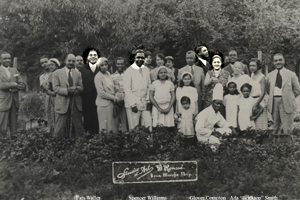All that jazz could be heard in all corners of our world
By Jennifer CarnigNews Office
 Taken at a party hosted by Ada “Bricktop” Smith in 1932, the above photo shows the remarkable number of musicians gathered in Paris at that time. The photo has been enhanced to highlight notable attendees such as (from left to right) pianist Fats Waller, composer Spencer Williams, pianist Glover Compton and Bricktop herself. Ada “Bricktop” Smith was a well-known singer and club owner at the time. Photo courtesy of the John Steiner Collection, Chicago Jazz Archive, University of Chicago Library. | |
In many people’s minds, jazz is the soundtrack of America. Planted in the southern soil alongside cotton and tobacco and nurtured in urban meccas such as New York, Kansas City and Chicago — jazz is the music of industry, protest and change.
But jazz also is a global music. As long as there have been jazz musicians there has been jazz in all corners of the world, from Shanghai and Delhi to Havana and Rio. There were even jazz bands such as the Ghetto Swingers in Nazi concentration camps.
“Hemingway wrote about walking into clubs in Paris in the 1920s and seeing jazz,” said Philip Bohlman, the Mary Werkman Professor in Music. “Well, how did it get there?”
“World Jazz/Jazz Worlds,” a conference taking place Thursday, May 25 and Friday, May 26, at the Franke Institute for the Humanities, is devoted to answering that question as well as the broader question of the international presence of jazz: How does jazz participate in globalization?
“People have the idea that jazz is America’s classical music,” said Travis Jackson, Associate Professor in Music, who, along with Bohlman, is helping to organize the conference. “But it’s much more than that. Jazz is global.”
James Reese Europe and his regimental jazz band accompanied the U.S. army to Europe during World War I but stayed on to record extensively on the French Path label; Jewish jazz musicians were able to leave Europe in the 1930s for Israel, where they performed for the British occupying forces; and on the Mediterranean island of Sardinia, musicians learned to play John Coltrane, not on saxophone or clarinet, but on traditional folk instruments.
“Jazz is why we see guitars in Indian classical music,” Bohlman said.
These developments are important for a number of reasons. According to Bohlman, with each contact jazz makes, the music responds to the local political and ideological conditions and problems. In the United States, jazz was a response to racial issues between black and white Americans, but in Bulgaria the story of race means something else entirely.
 Promising a “jubilee week of sunshine in music,” this advertisement for a series of performances by James Reese Europe and the Hell Fighters at the Auditorium Theatre first appeared in The Chicago Defender April 26, 1919. The Defender article is from the microforms collection of the University of Chicago Library. | |
“In American history, jazz was a form of resistance for African Americans,” he said. “A way to empower people who didn’t otherwise have a voice. In Cuba, it also served as the sound of resistance, but it helped fuel a different kind of revolution.”
In many ways, the story of jazz is just as much a tale of globalization as it is a story of the United States, said Jackson, who will deliver one of two keynote addresses at the conference.
“Jazz was not born in a vacuum,” he said, explaining that when musicians travel and commodities such as sheet music and recordings circulate, ideas are born. Influence knows no geographical boundaries, and as artists weave new sounds into their music, new styles are created. “What we call jazz was created in that movement of people and commodities through the Caribbean, Western Europe and the United States. It is the music of the African Diaspora.”
Eleven internationally-recognized jazz and popular music scholars will join Jackson and Bohlman for World Jazz/Jazz Worlds. Among them are researchers who work on the global influence of jazz in countries from Azerbaijan to the Balkans, and Colombia to Denmark.
In addition to Jackson’s keynote, ethnomusicologist Richard Middleton of the University of Newcastle upon Tyne in the United Kingdom—considered by many to be the founder of popular music studies—will deliver a keynote address on the multidimensional forms of jazz.
The conference is the American portion of a series of three intensive gatherings conceptualized by Bohlman and Goffredo Plastino, an ethnomusicologist at the University of Newcastle upon Tyne.
A truly international convergence, the first symposium took place last year in Newcastle, and the final conference is scheduled to take place next year in Sardinia. Ideas and texts from the three conferences will ultimately be combined to produce a book on the subject, Bohlman said.
The conference, which is sponsored by the Julie and Parker Hall Endowment for Jazz and American popular Music, begins at 1 p.m. on Thursday, May 25, at the Franke Institute, 1100 E. 57th St. in the Joseph Regenstein Library.
That evening, at 8 p.m., the University’s Jazz X-tet will perform a free concert in Fulton Recital Hall, 1010 E. 59th St., of the music of influential pianist, bandleader, composer and talent scout Fletcher Henderson (1897-1952). The conference will continue at 9 a.m. on Friday, May 26, at the Franke Institute.
All of the conference sessions are free and open to the public. For more information, contact the Franke Institute for the Humanities at (773) 702-8274.
![[Chronicle]](/images/sidebar_header_oct06.gif)